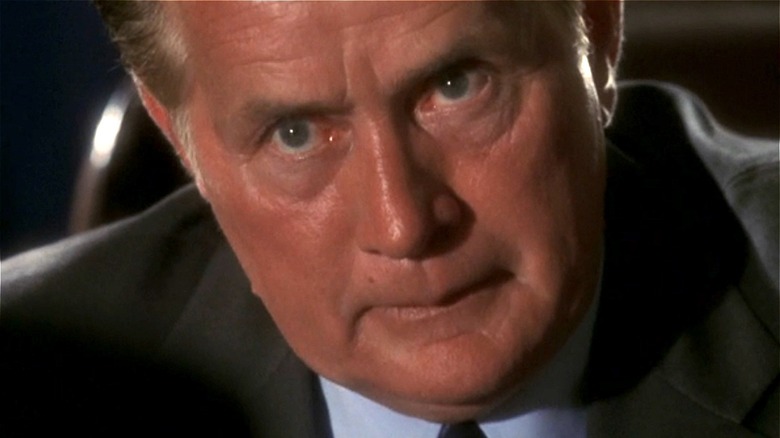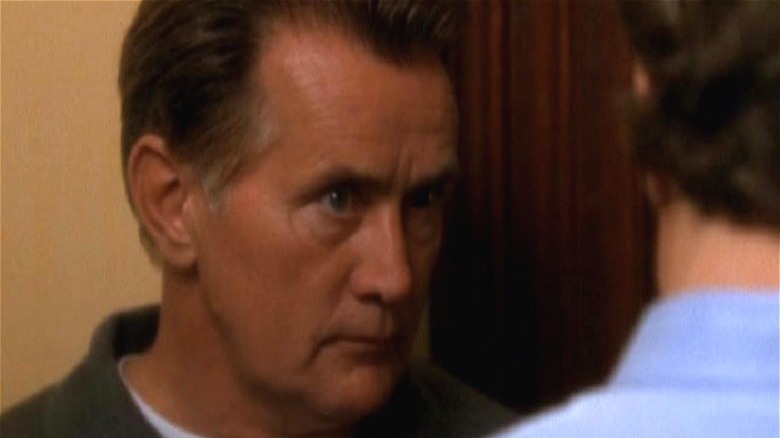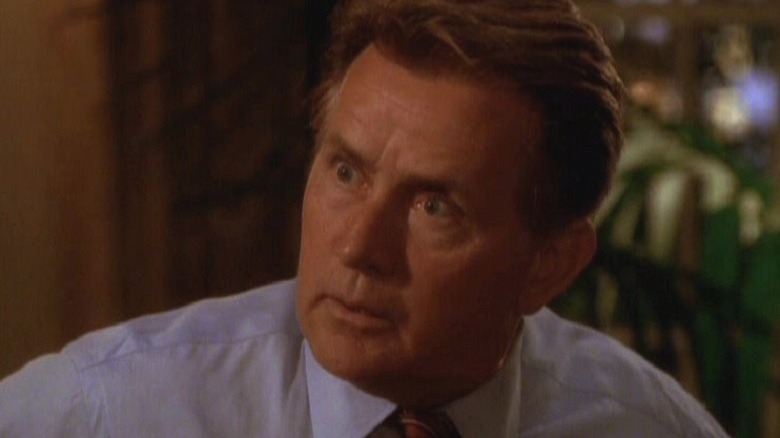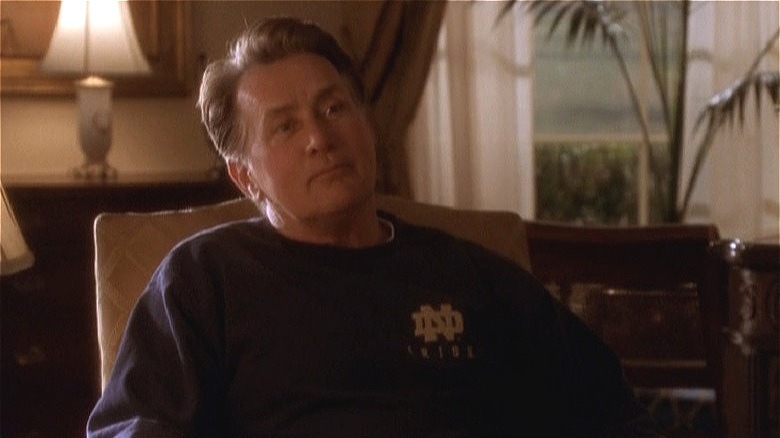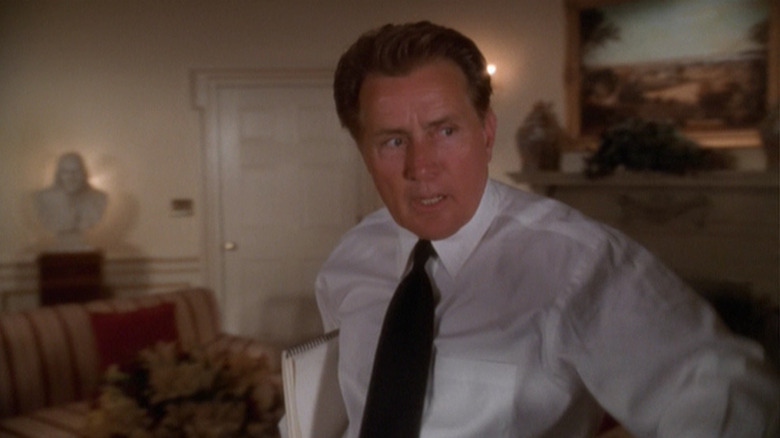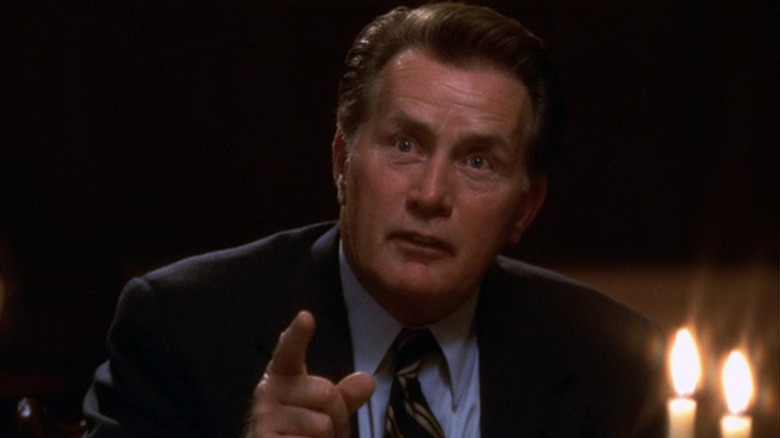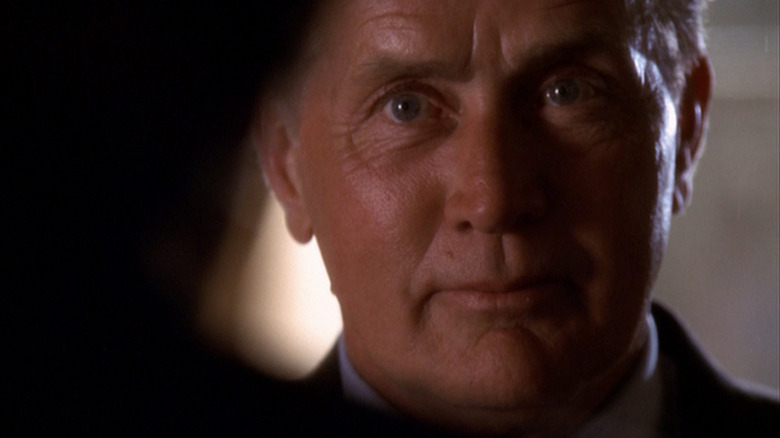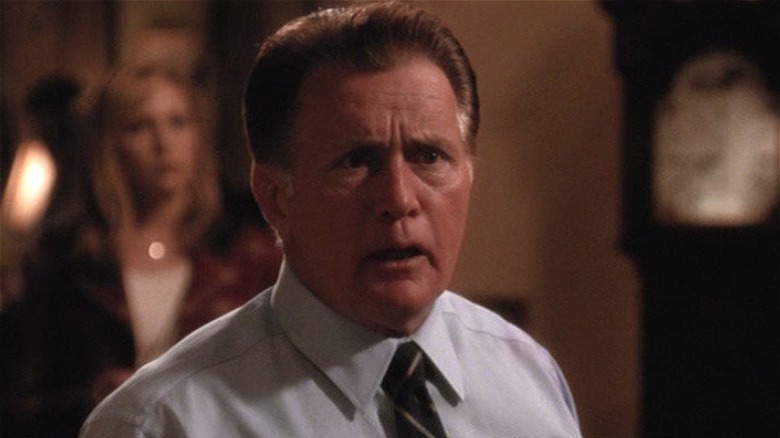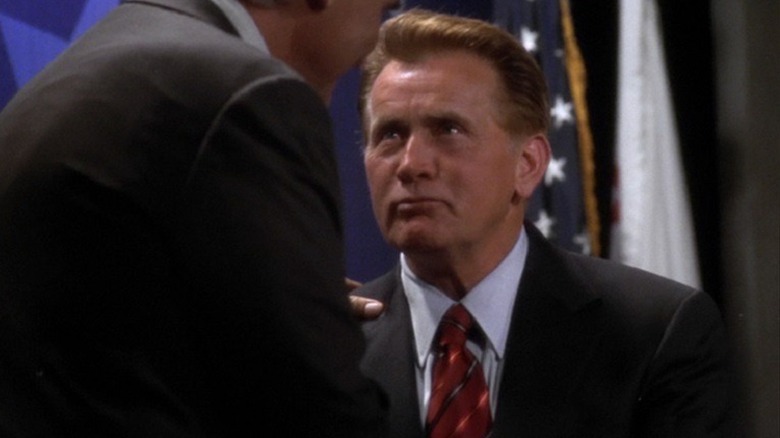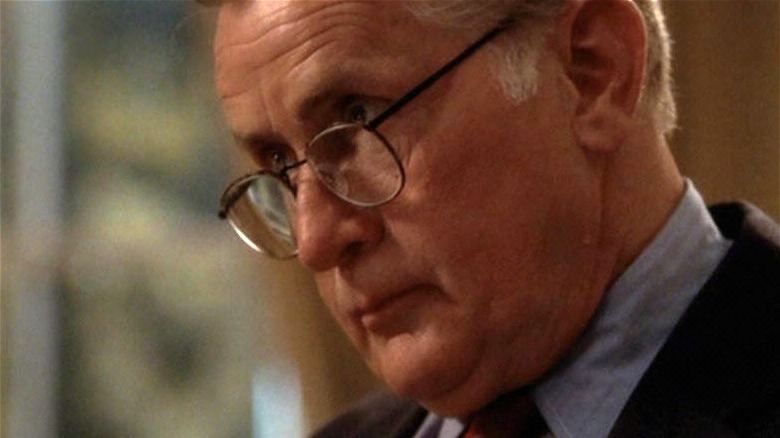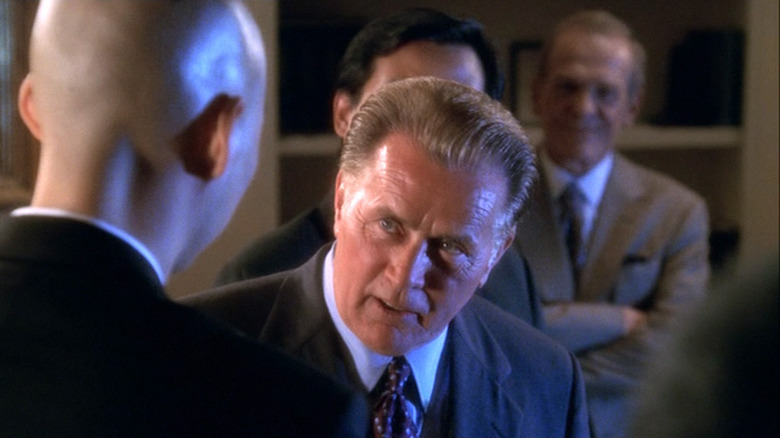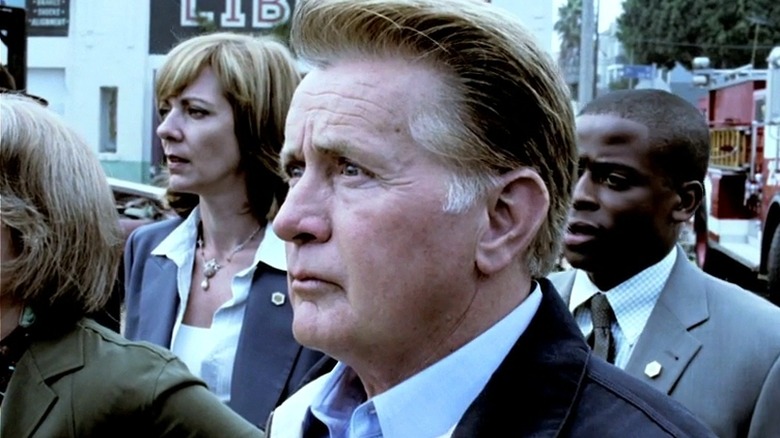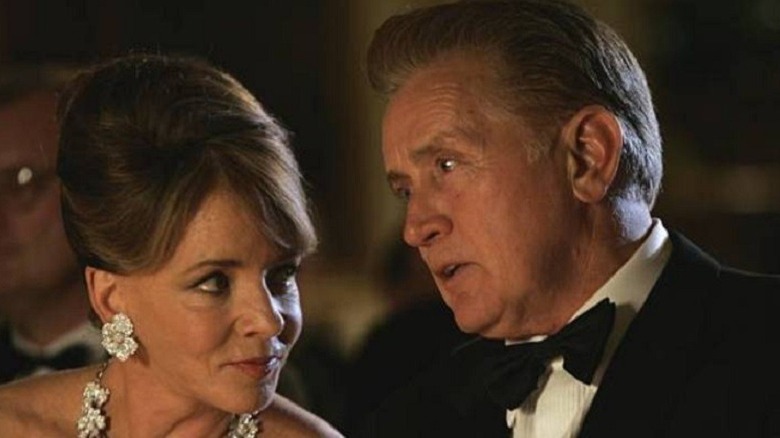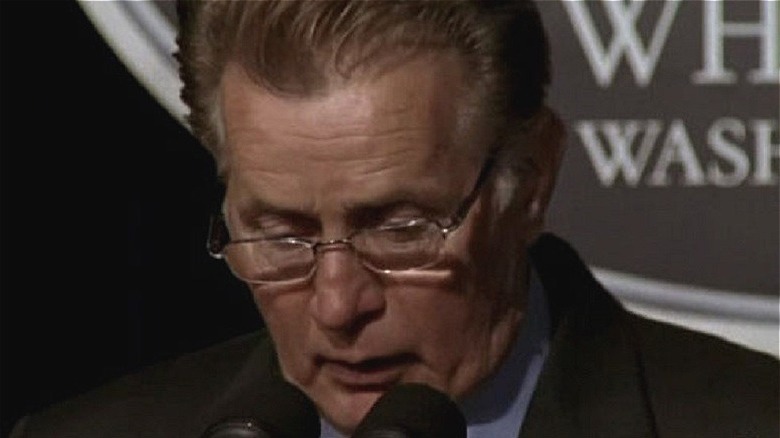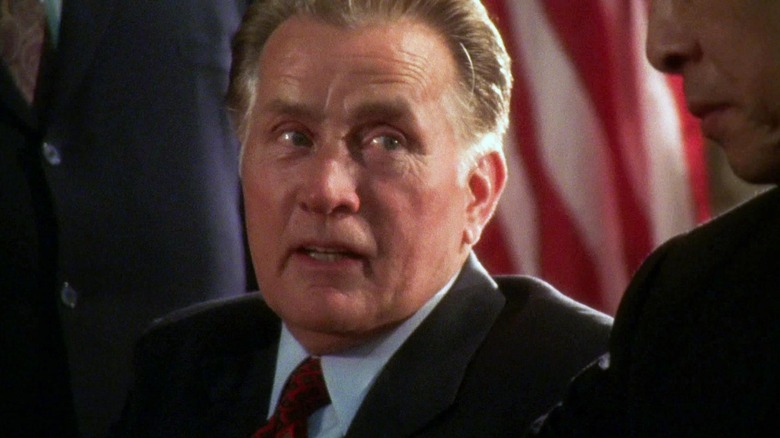Jed Bartlet's 7 Best And 7 Worst Episodes Of The West Wing
It's a crime that Martin Sheen never won a best actor Emmy for his work as President Josiah "Jed" Bartlet on Aaron Sorkin's "The West Wing." He was nominated for the award six times over the show's run, but there was always someone else who took home the prize. That doesn't change the fact that he's an incredible actor, and "The West Wing" will always be a shining example of his talents. President Bartlet is arguably the best fictional president ever put to screen — he's brilliant, compassionate, and assertive, and he has just as many flaws as he does strengths, something that has always endeared him to viewers. Jed struggles with everything you might imagine a president of the United States to struggle with, but he handles it all with grace. He's a huge part of why "The West Wing" is considered one of the greatest political television shows of all time.
Jed Bartlet came out on top when we polled hundreds of people about the best TV presidents. But, like all the best TV characters, he's not perfect. We've compiled a list of his best and worst episodes of "The West Wing."
Worst: The Crackpots and These Women (Season 1, Episode 5)
One big downside to a rewatch of "The West Wing" is the fact that it's now over 20 years old, which means that the social dynamics in Aaron Sorkin's writing sometimes feel pretty dated. "The Crackpots and These Women" isn't a terrible episode — in fact, the subplot surrounding Andrew Jackson's big block of cheese and Leo's commitment to hearing oft-ignored voices is really fun and interesting to watch. What makes it a bad episode for President Bartlet is the fact that he spends a fair amount of the episode commiserating over "these women" with the other men in the West Wing.
At the end of the episode, Leo and Jed are standing in a corner talking to Josh about how impressive all of "these women" around them are. You could argue that this isn't necessarily a bad thing, but the way they talk about CJ, Mandy, Mrs. Landingham, and the other women they work with is at best patronizing and at worst reads like adults being impressed by precocious middle schoolers.
Best: The Midterms (Season 2, Episode 3)
"The Midterms" is a good episode of "The West Wing." It follows the midterm elections as President Bartlet's staff continues to slowly recover from the traumatic shooting at the end of Season 1. Toby in particular spends the duration of the episode trying to understand why the Rosslyn attack has endured so disturbingly for the staff, and Jed is ultimately the one who helps him understand. "It was a lynching," he said, "they tried to lynch Charlie right in front of us." Charlie may have survived, but that doesn't change the fact that such enormous violence was undertaken solely from a place of bigotry and blind, ignorant hate.
Later, when he arrives at a reception with talk radio hosts, Jed gives one of the most epic verbal smackdowns in TV history. After peppering an ultra-conservative, homophobic radio host with a dozen questions about rules that are laid out in the Bible — "Does the whole town really have to be together to stone my brother, Jon, for planting crops side by side? Can I burn my mother in a small family gathering for wearing garments made from two different threads?" — he says, "One last thing, while you may be mistaking this for your monthly meeting of the Ignorant Tightass Club, in this building, when the president stands, nobody sits." It's one of the best examples of Bartlet's gravitas in the whole show.
Worst: Take This Sabbath Day (Season 1, Episode 14)
One thing that contributes to Jed's fully-fleshed characterization is his faith. He is Catholic (making him what would be only the second Catholic president of the United States ever), and a lot of ethical quandaries that he faces as the leader of a global superpower are deeply informed by his religious beliefs. Most of the time, it creates a really interesting tension to see Jed reconcile his faith-based values with his political views.
In "Take This Sabbath Day," though, Jed spends almost the entire episode moping around the West Wing because he has to decide whether or not to stay the execution of a prisoner who killed two drug kingpins. The president consults a rabbi, his hometown parish leader (who is, by the way, just as frustrated with Jed as the viewer), and even the Pope, all because he thinks that staying the execution is the right thing to do. We get it — it's a tough call. But it's a call that he made the minute he heard that the execution was scheduled, he just didn't want to admit it until much later.
Best: Two Cathedrals (Season 2, Episode 22)
Not only is "Two Cathedrals" one of the best episodes of "The West Wing" ever aired, but it's also one of the best episodes of television ever produced. It serves as a culmination of two seasons' worth of careful plotting to tell the story of President Bartlet's secret Multiple Sclerosis diagnosis. He knew about his MS before he even decided to run for president, and he and his wife Abby decided to keep it secret throughout his campaign and for most of his first term. In "Two Cathedrals," Jed deals with the loss of his longtime executive secretary and friend Mrs. Landingham (the episode shows flashbacks to Jed's high school years where he first met her while she was working for his father) and the reveal of his MS to the public.
Jed has two particularly incredible scenes in the episode. The first takes place in the cathedral after Mrs. Landingham's funeral where he yells at God for her death (it sounds heavy-handed but it's an excellent scene, we promise). The second occurs during a violent storm and a few minutes before Jed needs to arrive at a press conference regarding his MS. In that scene, he realizes that, despite his flaws and his mistakes, he owes it to himself and the world to continue trying to do good.
Worst: 100,000 Airplanes (Season 3, Episode 12)
"100,000 Airplanes" takes place immediately following Jed's acceptance of his Congressional censure for failing to disclose his Multiple Sclerosis during his presidential campaign. The episode focuses more on Sam Seaborn (Rob Lowe) than anyone else, and in service to that, Jed comes off a little wishy washy. After a dinner with Abby's oncologist friends, Jed decides that he wants to talk about curing cancer in his upcoming state of the union address, a desire which alarms his staff because the speech is almost entirely done.
In the previous episode, Jed spent a good amount of time convincing Leo that he was prepared to accept his censure with quiet graciousness, only to spend a huge chunk of the next episode trying to write a state of the union address that would undo it. Obviously, it's not a bad thing that he wants to cure cancer. But the fact that he tries to alter his gigantic speech a few days before its presentation, and use the idea of curing cancer as a way to make up for his lie of omission, is rather unsavory.
Best: Posse Comitatus (Season 3, Episode 22)
Season 3 of "The West Wing" is excellent, with "Posse Comitatus" serving as a nuanced and surprisingly dark finale. Much like the intricate Shakespeare performance happening on stage throughout the episode, there are many moving parts in "Posse Comitatus," all of which come back to center on a deeply conflicted Jed Bartlet. Jed mulls over his decision to assassinate the Qumari foreign defense minister after he helped orchestrate an attempted terrorist attack on the Golden Gate Bridge, while his staff struggle with the dynamics of running a presidential campaign while in office. Meanwhile, CJ's assigned secret service protector Simon Donovan (Mark Harmon) is shot and killed during a bodega robbery.
While dealing with all of these things, Jed runs into his opponent, Governor Robert Ritchie (James Brolin). The two men finally admit to the disdain they have for each other's political views and life philosophies. It's fun to see James Brolin and Martin Sheen in a showdown, and Jed's parting line — "In the future, if you're wondering: 'Crime. Boy, I don't know,' is when I decided to kick your ass" — sets up an exciting fourth season.
Worst: Arctic Radar (Season 4, Episode 10)
Most of Jed's storyline in this episode isn't actually bad at all. He and Leo work with intelligence and defense staff to recover a spy drone from Russian territory. The drone wasn't spying on the Russian government, but they still don't want to share proprietary technology and ask for help recovering their intelligence. In the end, Jed speaks with the Russian president and explains that they just need to trust each other and be honest, and it's another good showcase of his competence as president. He also has a particularly hilarious call with the U.N. secretary general about diplomatic immunity and parking tickets.
What doesn't work in this episode is the subplot surrounding the court martial of fighter pilot Vickie Hilton, a young woman who is facing military court for continuing a relationship with another officer after she was ordered to stop. Jed and Leo once again treat the issue like something they'd really rather not deal with, and are only forced to because the women in their lives won't shut up about it. It's really obnoxious, and Jed's refusal to get involved — despite the fact that he is the commander-in-chief of the United States military — feels like passing the buck.
Best: Game On (Season 4, Episode 6)
We constantly hear from the other characters on the show that Jed loves political debate, so it's great to see him in his element in "Game On." He's an intellectual powerhouse and his opponent Robert Ritchie is very much not. It's almost a little too satisfying to watch Jed debate Ritchie — there are a few moments where his verbal hits almost feel like picking the low-hanging fruit (for example, Ritchie refers to "unfunded mandate" as one big word, and Jed confidently points out that "unfunded mandate" is two words), but this episode is essential to Jed's character growth.
What's so great about "Game On" is that it marks the moment where Bartlet stops worrying about being likable and starts allowing himself to inhabit and express his extraordinary intellect without reservation. Like his fans in the show, viewers get to revel in the moment he wins his campaign for re-election against a man who often sought to diminish the value of intellect. It's without a doubt one of the best episodes of "The West Wing" ever.
Worst: Life on Mars (Season 4, Episode 21)
While Matthew Perry gives a great guest performance as White House counsel Joe Quincy in "Life on Mars," the episode is not Jed Bartlet's finest hour. Most of the episode doesn't focus on the president, but rather on Joe Quincy tracing a minor press leak until he discovers that Vice President Hoynes has been having an affair with a woman who is now writing a tell-all memoir. Hoynes has a long conversation with Leo and Jed upon this revelation, and even though they tell him that they can fight through the allegations and the scandal, Hoynes decides that resignation is the best thing for both him and the administration.
The problem with this episode as far as Jed is concerned is that he and Leo are squarely in Hoynes' corner despite the fact that he is a serial cheater and womanizer. In their conversation with the vice president, they say things like, "Don't you know the White House keeps phone records?" and "You will not let this cheap person bring you down" — both of which are quotes later used by Hoynes in his own tell-all book when he's trashing the Bartlet administration a few seasons later. Jed's words came back to haunt him, and he only had himself to blame.
Best: Han (Season 5, Episode 4)
"Han" is another episode where we can see the moral cost that Jed pays in order to do his job. An incredibly talented North Korean pianist arrives at the White House to perform a concert as an act of diplomacy between the two often-at-odds nations. Jai Yung Ahn (Tony Lee) conveys an acute sadness from the first minute he is on screen, and we soon understand why when he covertly attempts to request political asylum from the president without alerting his North Korean military handlers. Jed discusses the issue in depth with his staff and national security advisors, and eventually he is forced to deny Ahn's request due to hopes that North Korea will soon enter into negotiations regarding nuclear testing.
Ahn understands the position in which Jed finds himself, and he plays "The Celebrated Chop Waltz" (otherwise known as "Chopsticks") on the piano as he explains that the Korean word Han means being able to hold hope despite facing unmeasurable despair. Jed learns the true meaning of the word later in the episode when he discovers that the North Koreans have opted out of nuclear test negotiations, which means that he rejected Ahn's request for asylum for nothing.
Worst: Disaster Relief (Season 5, Episode 6)
Season 5's "Disaster Relief" finds president Bartlet dealing with the aftermath of his youngest daughter Zoey's kidnapping — she was taken on the night of her graduation from Georgetown University and held for ransom. Jed made the decision to temporarily step down from the presidency while Zoey was missing because he simply could not be both a father and the leader of the country at the same time. Early in the season, Zoey is found and Jed resumes the presidency, but there is a lingering sense of insecurity as he returns to the role and falls out with Abby. CJ pitches the idea that the president go to Oklahoma following a devastating storm and Jed agrees.
While at first it's a good idea, Jed takes the trip too far and decides to stay in Oklahoma for longer than is helpful. Eventually his motorcade, the press corp., and his general presence are more of a hindrance to disaster relief than a help, and Jed is staying there because he doesn't want to return to the much more emotionally complex work of running the country in that moment. It's understandable and a very human impulse, but it's not his best moment.
Best: A Change Is Gonna Come (Season 6, Episode 7)
This episode begins with business as usual: Jed receives a diplomatic delegation from Taiwan in the Oval Office and prepares for his trip to China. He accepts a Taiwanese flag gifted to him by the delegation, and later the entire world realizes that the flag represents Taiwanese independence from China — a very sensitive political issue, both then and now. Members of Congress, the West Wing staff, and countries all around the world (including China) believe that Jed's acceptance of the flag is a signal that it's time to support Taiwan in their efforts to become independent.
Throughout the episode, Jed asserts that he just didn't realize the meaning of the flag and his staff run around in a panic trying to put the ship back in the bottle, so to speak. At the very end of the episode, during a concert performance of Sam Cooke's "A Change Is Gonna Come" by James Taylor, Jed admits to Abby that he didn't see the Taiwanese flag due to a flare-up of his MS symptoms. His fear is palpable as he confesses to her, and her understanding yet supportive and bolstering response is a big part of what makes their marriage feel so deep and real on the show.
Worst: Liftoff (Season 6, Episode 4)
"Liftoff" marks CJ's first episode officially serving President Bartlet as his chief of staff. As expected, it's an overwhelming leap from press secretary to chief of staff. CJ must deal with reams of reading material, increased secret service security, the needs of all the staff she now supervises, and the insolence of the Secretary of Defense Miles Hutchinson, among a dozen or so other things. CJ finds her stride by the end of the episode — no thanks to the president.
After Hutchinson circumvents CJ in order to sway the president's opinion on a matter pertaining to the Department of Defense, CJ is irritated and Jed is no help. Of course, CJ needs to rein in Hutchinson and many of the other people whose interests she must balance in consideration of the president's time, but he could at least say, "Hey, Miles, you know there are specific channels you need to go through and just because Leo is no longer my chief of staff doesn't mean they don't still apply." Instead, he just takes whatever anyone hands him. Way to undermine your new right-hand woman, Jed.
Best: Impact Winter (Season 6, Episode 9)
This episode is really the turning point in Jed's Multiple Sclerosis journey. His disease is very much no longer in remission, and is officially having a serious impact on his ability to do his job as president. The happenings of "Impact Winter" were foreshadowed by Jed's MS symptom flare-up in "A Change Is Gonna Come." Now, though, Jed has worked through the fear he feels regarding his loss of control over his body, and the viewer can feel his visceral rage and frustration at his inability to harmonize the wants of his mind with the needs of his body. He is unable to meet with the president of China for most of their diplomatic summit, and, as a result, he doesn't accomplish anything he really wants to.
At the final photo op, Jed makes a play for a private conversation with the Chinese president, and, several hours later, he returns to his wife and his staff having secured many of the diplomatic agreements he thought were lost. His staff is awed, but later on the surgeon general's words of warning — "At this point in his disease, there is a cost" — come back to haunt everyone on Air Force One as Jed collapses and falls ill. He accomplished what he wanted to accomplish, but his body paid a hefty price.
